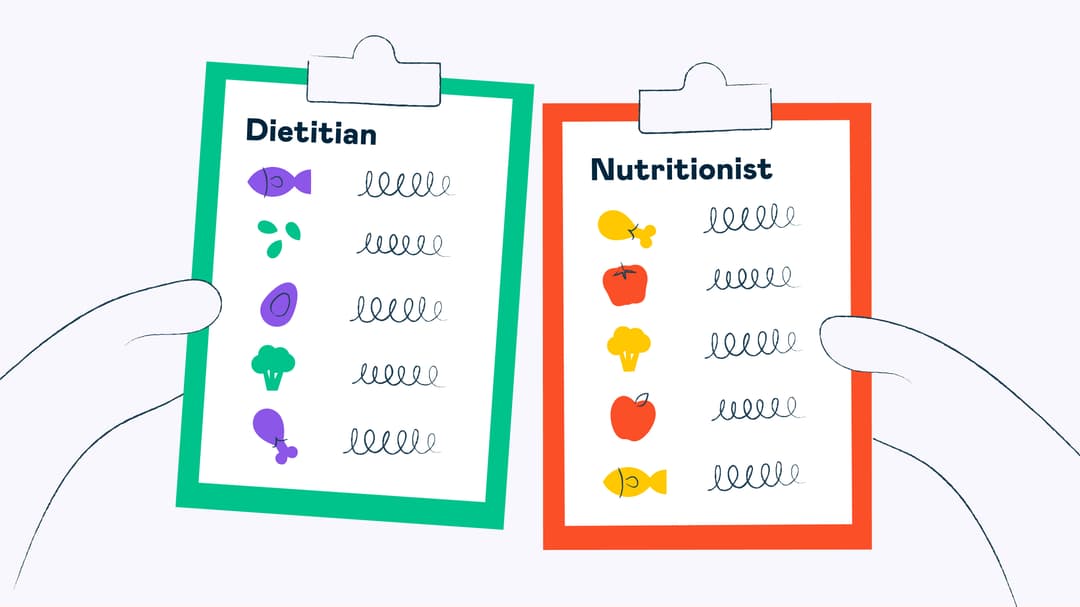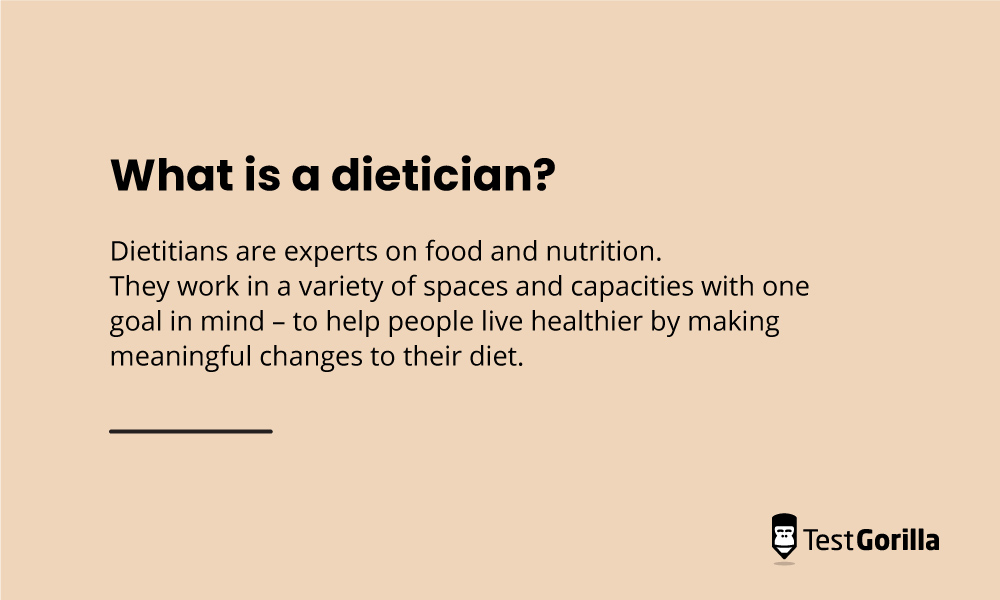All Categories
Featured
Table of Contents
-1
In the United States and many other nations, a dietitian is a board-certified food and nutrition expert. They are extremely informed in the field of nourishment and dietetics the science of food, nutrition, and their influence on human health. Through comprehensive training, dietitians obtain the know-how to offer evidence-based clinical nutrition therapy and dietary counseling customized to meet a person's needs.
-1To earn these credentials dietitians-to-be should first earn a bachelor's level or comparable credit reports from an accredited program at a college or university. Normally, this needs an undergraduate science level, consisting of courses in biology, microbiology, organic and not natural chemistry, biochemistry, composition, and physiology, as well as more specific nutrition coursework.
Plant-based Nutritionist – Wanneroo 6034
-1This permits them to assess acute requirements, prioritizing life-threatening conditions. Inpatient and outpatient dietitians also supply nourishment education and learning to individuals with specialized needs, such as those recently out of surgery, in cancer treatment, or detected with chronic illnesses like diabetic issues or kidney disease. In the outpatient setup, they provide much more extensive dietary counseling working towards a nutrition-oriented objective.
-1They can additionally support for public laws with a focus on nourishment, food, and wellness concerns. Research study dietitians normally operate in study hospitals, companies, or universities. They run within a research study team headed by a primary detective and perform nutrition-focused interventions. When dietitians have made their qualifications and are operating in the area, they can take place to focus on a particular subcategory, such as pediatrics or sports dietetics.
-1Others may work as wellness and nutrition experts in media or as public audio speakers (Family Nutritionist). Dietitians are qualified to take care of nutrition therapy across a period of intense and persistent conditions.
Women’s Health Dietitian
-1In lots of states, such as Alaska, Florida, Illinois, Maryland, Massachusetts, and Pennsylvania, RDs and CNSs are given the same state license, usually called an Accredited Dietitian Nutritional Expert (LDN) license. In states that do not control using this term, any individual with a rate of interest in diet or nutrition may call themselves a nutritionist.
-1However, due to the fact that uncredentialed nutritionists commonly do not have the competence and training for clinical nutrition treatment and nutrition counseling, following their suggestions might be thought about hazardous (). Before getting in touch with a nutritionist, you may intend to examine whether your state regulates who might use this title. In the united state states that don't control the term, no levels or qualifications are needed to be a nutritional expert.

-1
In states that do mandate licensure, the CNS or RD credential may called for. Those with CNS credentials are health professionals like registered nurses or physicians with advanced wellness degrees who have chosen additional coursework, completed monitored practice hours, and passed an examination managed by the Board for Certification of Nutrition Specialists.
-1While several of these methods may have durable clinical backing, others might not. Offering nourishment recommendations without the correct expertise and training can be harmful, especially when counseling those with health and wellness problems. If you are considering consulting a nutritional expert, you might want to ask if they are a CNS or have state licensure or qualification, or another credential.
Clinical Nutrition Counseling – Wanneroo
-1Several states particularly manage this term. In addition, nutritional experts might pursue an advanced CNS accreditation.
-1It can be testing to help individuals make authentic, lasting modifications in their lives. Both dietitians and nutritional experts offer a range of nutrition-based services to customers.
-1They should have finished some level of education and learning in their area. They are likewise called for to have completed approximately a year of supervised job, working within a guided program at a health care center, providing service, or area body. Dietitians have much higher expectations placed on their capabilities and degree of expertise.
-1This indicates that there is no body that supervises their certifications and no specifically stringent guidelines that nutritionists requirement to follow in order to be able to practice. Dietitians, on the other hand, are registered with across the country recognised bodies, such as the Dietitians Association of Australia. They must follow by the National Proficiency Requirements for Dietitians.
Sports Nutrition Support – Wanneroo 6034

-1
Nevertheless, you can exercise as a nutritional expert without the very same level of certification as a dietitian. Nutritionist programs can differ in length and top quality, with some as brief as 6 weeks and covering much less material than a dietetics training course. Relying on your education and learning provider, you can obtain a considerable amount of expertise through researching a straightforward nourishment course; nevertheless it is essential to investigate the training course material prior to beginning.
-1This can consist of participating in sector seminars or reviewing sector magazines. Nutritionists, on the other hand, normally earn their certifications in order to supplement various other certifications and provide much better advice to their clients. Nutritional experts can get employment in a large array of areas, including public health and wellness guidance, suggestions for individuals, and collaborating with exclusive organisations.
-1Nutritionists can work with sporting organisations, health clubs, institutions and encourage media electrical outlets on standard terms and proper usage of terms. Dietitians can function in most of the same roles as nutritionists.
Child Nutrition Guidance
-1Dietitians frequently deal with more clinically delicate customers. These can consist of those with diabetes, allergies, obesity, cancer and stomach conditions. As a result of the high level of understanding called for to provide solutions to these people, just accredited dietitians are permitted to supply care. A few of the higher level functions with medical care institutions can be very satisfying, and pay rather well.
-1In Australia there is a distinction between a dietitian and various other nutritional health providers including nutritional experts. All dietitians are nutritionists, but nutritional experts without a dietetics certification can't call themselves a dietitian. While there are similarities in between a dietitian and nutritional expert there are distinctions in certifications and policy. The dietetic career is regulated and fulfills stringent requirements as established out by the National Alliance of Self Regulating Wellness Professions (NASRHP).
-1Dietitians with the Accredited Practising Dietitian (APD) credential dedicate to ongoing training and education throughout their professions. They stick to our code of conduct. Dietitians have the understanding and skills found in the National Proficiency Standards for Dietitians. As an occupation, nutritionists are not regulated in Australia under NASRHP or licensed under a single regulatory body.
Best Dietitian For Weight Loss (Eglinton )
-1If you have a persistent health condition and a treatment plan from your General practitioner, you may be able to assert a Medicare refund when you see an APD. The main objective of people working in the profession of dietetics is embodied in this declaration: The occupation of dietetics adds to the promotion of health and wellness and the prevention and treatment of illness by optimising the nutrition of populaces, areas and individuals. Weight Loss Nutritionist.
Latest Posts
Dietwise.net.au - Children ( Bassendean)
Diabetes & Insulin Resistance – Stirling 6061
Lily Macfarlane – Hammond Park